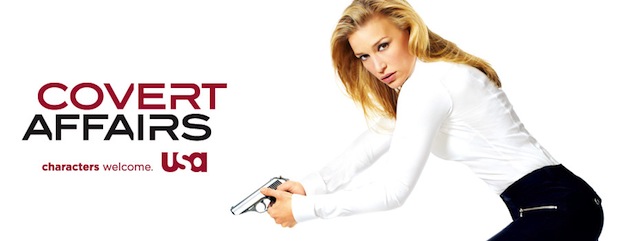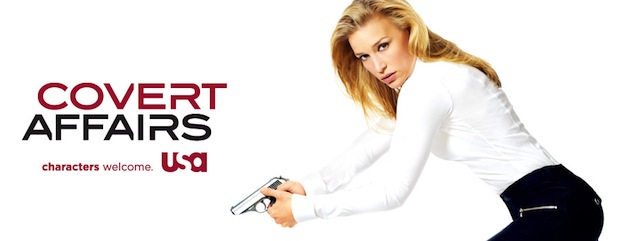
In episode 3 of Covert Affairs, Universal Cable Productions simulated Caracas, the capital city of the South American country of Venezuela, both visually and linguistically (at least they attempted the latter). Covert Affairs is an enjoyable new series from USA Network (a division of NBC Universal) which last week broadcasted episode 3 (Southbound Suárez), where the protagonist Annie Walker (Piper Perabo) -a novice CIA agent- is sent to Caracas to carry out her third assignment. This article will describe a bit about that, and about Universal Cable Productions’ feat in simulating Venezuelan scenes, along with some cultural and linguistic blunders.
About Covert Affairs episode 3’s synopsis
Here is the synopsis for episode 3 (mostly) from the official website (although enriched):
Bonding (and flirting) over a hard-fought game of soccer (European football), Annie gets close to a young college student, Diego Suárez (Michael Steger).
But it’s all part of life in the CIA – Annie’s objective is to gain access to Víctor Ponces (Julián Acosta), a corrupt government official in Venezuela… whose mistress just happens to be Julia Suárez (Lana Parrilla), Diego’s older sister.
Taking advantage of Diego’s crush (as well as letting him know that if he doesn’t cooperate, he could be deported), Annie gets Diego to accompany her back to Caracas, Venezuela, to convince Julia to help the CIA track Víctor’s financial dealings. All Annie has to do is accompany him, hand him off to the local CIA station agent, and then return.But when the CIA station agent, López, fails to show, Annie is unexpectedly given the job of enlisting Julia’s help to uncover evidence of Víctor’s illegal dealings. At first, Julia refuses to believe Annie’s claim that Víctor is a bad man, but is ultimately convinced to cooperate, for Diego’s sake. Once Annie meets Víctor, however, other local Venezuelan CIA agents deliver the bad news – they found the body of López, and that new necklace Víctor gave Julia? A trophy Víctor took from López. But with the plan already in motion, Annie has no choice but to finish the job, and hope that Víctor hasn’t figured out yet that she’s a CIA agent.
Visual adaptations to simulate Caracas, Venezuela when shooting in Toronto, Ontario, Canada
As many readers of ProVideo Coalition know, I am from the USA, but have traveled extensively in Latin America, and continue to do so several times per year, whether it be for consulting, giving seminars, attending a friend’s wedding, or a friend’s premiere in a theatrical play. Among 14 Latin American countries I’ve visited so far, Venezuela and Colombia have been two that I have visited most frequently (about 12 visits so far to each of those 2 countries), so since seeing the opening scene of Covert Affairs episode 3, I was quite anxious to see how real Caracas would look (and sound) in the rest of the episode. Of course, that was before watching the entire episode and then researching how it was shot and produced. Although it has been since 1999 that I was in Caracas the last time, the street signs looked quite authentic to me, as well as the quick shot of the ranchos (see photo below), a Venezuelan term which (quite unlike in M©xico), refers to poor dwellings or slums.
In fact, that shot looks so real that it might have been authentic Venezuelan stock footage. (More about that word ahead in this article.)
According to the Covert Affairs official website, most of the Ferrari high-speed scenes were shot with a stationary Ferrari in front of a green screen.
It also says that the stunts were done with the Ferrari on a small, secluded road near Burlington, Ontario, Canada, with a stunt double of the protagonist Annie Walker (Piper Perabo).
Finally, it says that the street signs were modified to look like Caracas. It does not clarify whether the modification was done by changing the signs physically, or by using an application like Adobe After Effects in post, but it looks very real to me. We are attempting to contact the production crew to determine that, as well as other information.
The official website also states that the playing field where Annie and Diego played soccer in the opening scene -which pretends to be at Georgetown University- was actually shot at Lorreto Abbey School in Toronto (see photos in the synopsis section, above).
The Venezuelan “Banco Nacional” (see photo above) was actually shot using the Canadian Imperial Bank of Commerce in downtown Toronto,
except for the small -secure room- interior scenes (shown above), which was a set in an airport hangar in Burlington, Ontario, Canada. In this shot, Víctor Ponces is reading and dictating the latest password to his account to his banker and lover, Julia Suárez, before transferring funds to an account belonging to the FARC.
Linguistic blunder 1
In the very first scene where Annie Walker attempts to impress Diego Suárez by asking something in Diego’s native language, she blundered.
I wouldn’t even have known what she actually intended to ask if it hadn’t been for the context, and for the English subtitle. She meant to ask “Anything?”, but if I were to back-translate what she actually said (¿Alguna cosa?), it would literally mean “Some thing?”. That would have not been an issue if the blunder had fit her character properly, but her character is that of a CIA agent who -as defined by her own colleagues back at CIA headquarters- is supposed to be a fluent speaker.
Back at CIA headquarters in Langley, operative Auggie Anderson (Christopher Gorham, center of photo) assesses the unexpected situation in Caracas, and states that Annie: “… is fluent; knows Caracas; and has a relationship with Diego.” so they should have her continue with the mission.
Given that her character is supposedly fluent, Annie should have asked: “¿Cualquier cosa?” to mean “Anything?”. So for any viewer who really speaks the language of Cervantes, what Annie said doesn’t match the character who is being portrayed, unless the intention were to ridicule the CIA, which is certainly not the purpose of the show, or of the character.
Linguistic/cultural blunder 2
Many times during the episode, several characters used the inappropriate term favela to refer to poor dwellings or slums. Sorry, wrong language, and wrong country! The word favela is actually a Brazilian word, where they speak Portuguese, as opposed to the rest of Latin America, where they speak Castilian (although many people imprecisely call it “Spanish”). This favela word was said repeatedly, not only by the protagonist and her CIA boss, but also by the characters who were supposed to be Venezuelan! The word that would be used in Venezuela to refer to those dwellings or slums would be ranchos. (The meaning of rancho is quite the opposite in M©xico.) Someone even decided to nickname the Julia Suárez character (Lana Parrilla) as La madre de la pavela to indicate that she was a philanthropist in poor neighborhoods, but this term is quite inappropriate for Venezuela.
Linguistic blunder 3
Regarding the cultural/linguistic blunders
I am not blaming the actors or the scriptwriter for the aforementioned cultural and linguistic blunders (or the other ones that I have chosen not to include here). In fact, none of the main “Venezuelan” characters mentioned above are actually played by Venezuelan actors (or by a Venezuelan actress), so they shouldn’t be expected to know these details about Venezuela. They are all excellent actors and actresses. I am blaming the linguistic/cultural consultant for this episode… or if there wasn’t any, then I suppose I’m blaming the crew member who should have hired one. Perhaps they’ll hire me the next time they need this type of help! I can even teach them the unique “Happy Birthday” song sung in Venezuela 🙂
Possible interview for ProVideo Coaliton and TecnoTur
We are attempting to contact the production crew to do a telephone interview, to use the audio for TecnoTur, and for a possible followup article in ProVideo Coalition. If any crew member reads this before we reach you, please contact me!
Link to official Covert Affairs website
You may visit the official website at covertaffairs.usanetwork.com to read more about the show, or to watch past episodes, including episode 3. I enjoyed it very much, despite the cultural/linguistic blunders!
Allan T©pper’s consulting, articles, seminars, and audio programs
Contact Allan T©pper for consulting, or find a full listing of his articles and upcoming seminars and webinars at AllanTepper.com. Listen to his TecnoTur program, which is now available both in Castilian and in English, free of charge. Search for TecnoTur in iTunes or visit TecnoTur.us for more information.
Disclosure, to comply with the FTC’s rules
No manufacturer, TV network, production company, or the CIA is paying Allan T©pper or TecnoTur LLC specifically to write this article. However, if the CIA were paying for it, it is likely that said information wouldn’t be revealed here, because of national security concerns, and in that non-existent case, the absence of said information would have been covertly sanctioned.

